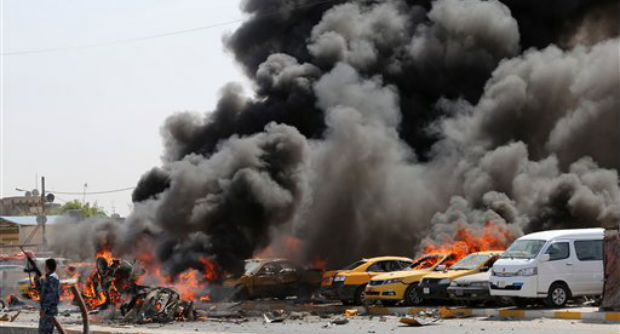Jihadists closing in on Baghdad; Kurds join fray

In this file photo taken Tuesday, May 13, 2014, an Iraqi policeman stands by burning vehicles moments after one in a series of bombs hit the Shiite stronghold of Sadr City in Baghdad, Iraq. AP FILE PHOTO
BAGHDAD—Jihadists pushed toward Baghdad on Friday as US President Barack Obama said he was exploring all options to save Iraq’s security forces from collapse and US companies evacuated hundreds from a major air base.
The Shiite-led government of Iraq’s Prime Minister Nouri al-Maliki remained paralyzed, unable to form a coherent response after militants from the al-Qaida-inspired Islamic State of Iraq and the Levant blitzed and captured entire chunks of the nation’s Sunni heartland this week, including major cities, towns, military and police bases as Iraqi forces melted away or fled.
With militants closing in on the capital, forces from Iraq’s autonomous Kurdish region took control of a swath of territory they have sought to rule for decades against the objections of successive governments in Baghdad.
Foreign Minister Hosyhar Zebari acknowledged that the security forces Washington invested billions of dollars in training and equipping before withdrawing its own troops in 2011 had simply melted away.
Obama said Iraq was going to need “more help from the United States and from the international community.”
Article continues after this advertisement“Our national security team is looking at all the options … I don’t rule out anything,” he said.
Article continues after this advertisementWestern failure
Russia said the lightning gains by the Islamic State, a movement so radical it has been disavowed even by al-Qaida’s leadership, showed the pointlessness of the 2003 US-led invasion, carried out in the aftermath of the 9/11 attacks in the United States.
Washington found rare common cause with its longtime foe Tehran, with both voicing dismay at the Sunni extremists’ advance and pledging to boost aid to Maliki, who is a Shiite.
The militants, who have swept up a huge swath of predominantly Sunni Arab territory in northern and north-central Iraq since launching their offensive in the second city Mosul late Monday, advanced into ethnically divided Diyala province.
Kurds step into breach
On Friday, the militants were fighting progovernment forces near Muqdadiyah, just 80 kilometers from the Baghdad city limits.
Diyala’s mixed Arab, Kurdish, Sunni and Shiite population has made the province a byword for violence ever since the 2003 overthrow of Sunni Arab dictator Saddam Hussein.
Kurdish security forces moved into the strategic Sadiyah and Jalaula districts of the province overnight after the army withdrew, Deputy Gov. Furat al-Tamimi said.
Kurdish forces already took control of the ethnically divided northern oil city of Kirkuk on Thursday when central government troops pulled out.
It has been the fulfillment of a decades-old Kurdish ambition, opposed by successive governments in Baghdad, to expand their autonomous region in the north to incorporate a swath of historically Kurdish-majority territory across northern and north-central Iraq.
Government paralyzed
Maliki’s government has been left floundering by the speed of the jihadist assault.
The swift collapse of Baghdad’s control comes on top of the loss of Fallujah, west of Baghdad, earlier this year. It has been a blow for Western governments that have paid a steep price both in lives and money in Iraq.
The Iraqi foreign minister acknowledged the collapse of the security forces in Mosul and other cities, with many personnel melting away after discarding their uniforms.
“It is a setback definitely for the Iraqi security forces, who collapsed in the largest city and abandoned their weapons and equipment,” he said.
US mulls drone strikes
Washington is considering several options for offering military assistance to Baghdad, including drone strikes, a US official told Agence France-Presse on condition of anonymity.
Resorting to the unmanned aircraft—used in Afghanistan, Pakistan and Yemen in a highly controversial program—would mark a dramatic shift in the US engagement in Iraq, after the last American troops pulled out in late 2011.
But there is no current plan to send ground troops back into Iraq, where around 4,500 American soldiers died during the conflict.
US evacuation
US companies were evacuating “a few hundred” American contractors working with the Iraqi government from Balad air base, 70 km north of the capital, a US defense official said.
The contractors “are being temporarily relocated by their companies due to security concerns in the area,” US state department spokesperson Jen Psaki said.
Russian Foreign Minister Sergei Lavrov said the spectacular collapse of the Western-trained Iraqi Army illustrated “the total failure of the adventure involving the United States and Britain.”
‘Hell on earth’
And Obama’s Republican opponents in Congress were swift to accuse the president of abandoning Iraq by pulling out US troops in 2011.
Sen. Lindsey Graham warned a jihadist takeover in both Iraq and neighboring Syria would create a “hell on earth” and called for the urgent deployment of US air power to “change the battlefield equation.”
Turkey said it was holding talks to secure the release of dozens of its citizens kidnapped by Islamist militants in northern Iraq amid international calls for their release.
The UN Security Council demanded urgent dialogue and condemned “terrorist” activities, but stopped short of considering action against the militants.
As many as half a million people have fled the jihadist offensive and the World Food Program said it had started providing assistance to 42,000 of the most vulnerable. Reports from AFP and AP
RELATED STORIES
Little known jihadist group vows new Egypt attacks
Spain, Morocco bust jihadist recruitment cell